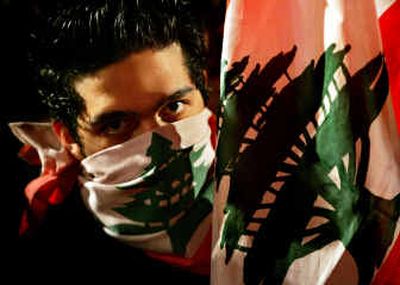Syria expected to pull troops

BEIRUT, Lebanon – Syrian President Bashar Assad is expected to announce today that he will pull thousands of his troops in Lebanon closer to the Syrian border or out of the country, but President Bush rejected any “half-hearted” moves short of a full withdrawal.
Assad faces a storm of international criticism over his refusal to accept international demands for the withdrawal of Syrian forces.
In the past week, mass street protests in the Lebanese capital have denounced Syrian influence in the country, forced the resignation of the Syrian-allied prime minister and drawn blunt warnings even from Syria’s allies, Saudi Arabia and Egypt.
Assad is expected to announce a pullback or partial withdrawal in a speech to parliament Saturday, a senior Syrian diplomat told the Associated Press. But, in a sign of deepening strains between Washington and Damascus, Bush dismissed those gestures as insufficient.
“When the United States and France say withdraw, we mean complete withdrawal, no half-hearted measures,” Bush said during an appearance in New Jersey.
The growing dispute between Syria and Lebanon has drawn wide attention across the Middle East as a rare case of popular protest putting significant pressure on an authoritarian government like Syria’s.
The Bush administration, meanwhile, has heralded Lebanon’s challenge to the Syrian regime as consistent with Bush’s oft-stated commitment to refashion the autocratic political order of the region from North Africa to the Persian Gulf.
The United States has embraced the issue of Syrian troops in Lebanon as a lever to apply renewed pressure on the embattled Syrian leader, after months of accusing him of abetting the Iraqi insurgency and sheltering Islamist militant groups.
As a result, Assad faces two undesirable options: bend to U.S. pressure and risk losing face at home or continue to resist international pressure and suffer isolation.
The United States and France issued a forceful joint statement this week calling for the immediate withdrawal of all Syrian soldiers, estimated around 16,000, and the sprawling network of Syrian intelligence agents.
Syrian troops have been in Lebanon since June 1976, when the Christian-led government asked for support from Syria against the Muslim-dominated Lebanese National Movement. The number of troops has been as high as 30,000.
The 1989 accord, known as the Taif agreement, called for a phased withdrawal but it has never been implemented, in part because Syria has long maintained that it plays a vital role in protecting Lebanon from Israeli incursions.
But support for that argument has sharply eroded in Lebanon, where an opposition movement is calling for a pull-out before parliamentary elections scheduled for May.
Opposition leaders reiterated their skepticism that any announced withdrawal would satisfy protesters.
“We can’t have elections as long as Syrian troops are in the country,” said Fared al-Khazen, dean of political science at the American University of Beirut and a strategist in the opposition movement. “Basically, they run the country. So you cannot have free and fair elections when you have such a situation. So it cannot be several months or several years.”
The Lebanese campaign to get rid of Syrian troops was triggered Feb. 14, when a car bombing in downtown Beirut killed Lebanon’s popular former prime minister, Rafik Hariri.
The outpouring of public grief soon grew into an anti-Syria movement, as Lebanese widely blamed Syria and its allied government in Lebanon, which they suspect of orchestrating the attack.
With more than 25,000 Lebanese flooding the streets Monday to denounce the government, Lebanese Prime Minister Omar Karami resigned. The demonstrations have become a tent-city protest in the heart of the capital.